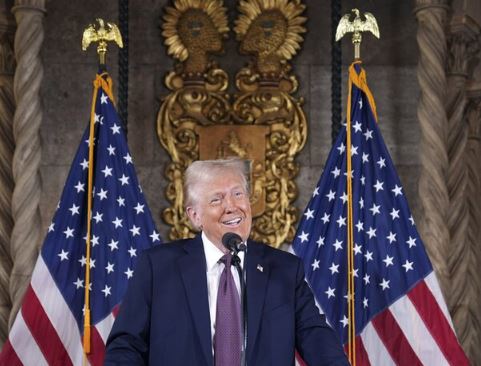Canada, Panama & NATO Budget- 3 New Donald Trump Visions: Strategic or Dangerous?
Donald Trump’s recent 3 new foreign policy proposals, including reclaiming the Panama Canal, and annexing Canada & Greenland and forcing NATO members to contribute 5% of GDP to defense, have sparked sensitive international debate. These bold ideas highlight the former president-elect Donald Trump’s thought process to challenge prevailing norms, but they also raise important concerns about the potential impact on geo-politics and U.S. credibility. Let us understand Donald Trump’s Canada, Panama & NATO Policy.
A New Manifest Destiny?
Donald Trump’s vision seems to invite a modern interpretation of Manifest Destiny, a belief in the expansion of U.S. influence across territories deemed strategically or economically valuable.
U.S. Interest in Greenland & Annexing Canada
An idea Donald Trump has floated before—is rooted in its vast untapped resources and geopolitical importance as the Arctic gains growing prominence in global affairs with each passing year. Yet, the Danish government has unequivocally rejected such overtures in U.S. Policy, if they materialize, emphasizing Greenland’s sovereignty and self-determination.
The proposal to annex Canada as the 51st U.S. state, arguably the most far-fetched of these ideas, seems more like a fiction than a policy initiative. Canadian leaders across the political spectrum have firmly rebuked the notion, pushing forward Canada’s identity as an independent and thriving democracy. Such visions risk dangerously alienating Canada, one of America’s closest allies and trade partners.
“You get rid of that artificially drawn line, and you take a look at what that looks like, and it would also be much better for national security.”
Donald Trump- President-Elect, U.S.

“Greenland, a self-governing part of our kingdom, is not for sale. I don’t think it’s a good way forward to fight each other with financial means when we are close allies and partners,”
Denmark’s Prime Minister Mette Frederiksen
Panama Canal
Similarly, Trump’s calls to reassert U.S. control over the Panama Canal reflect a dangerous desire to secure key infrastructure that plays a crucial role in global trade. His accusations of excessive fees and alleged Chinese influence over canal operations align with his America-first policy but disregard Panama’s legitimate sovereignty and the peaceful resolution of the 1977 Torrijos-Carter Treaties.
“The only hands that control the canal are Panamanian and that’s how it will continue to be,”
Javier Martinez-Acha, Foreign Minister, Panama

NATO Spending Demands: Visionary or Divisive?
Beyond territorial ambitions, Donald Trump’s push for NATO allies to increase defense spending to 5% of GDP represents another risky departure from established norms. While advocating for greater burden-sharing among allies is a legitimate concern, such a sharp increase could put excessive pressure on the budgets of NATO member states and undermine unity within the alliance. Critics warn that these demands might alienate key partners at a time when collective defense is of profound importance.
“I think NATO should have 5%, They can all afford it, but they should be at 5%, not 2%. Europe is in for a tiny fraction of the money that we’re in. We have a thing called the ocean in between us, right? Why are we in for billions and billions of dollars more money than Europe?”
Donald Trump, President-elect, U.S.
Trump, who sees himself as a dealmaker, naturally also hopes that the increased financial commitment of the European partners will benefit US industry in particular. But please don’t make up a number out of thin air. We are not at a bazaar here.
Marie-Agnes Strack-Zimmerman, Politician, Germany
“Will strengthen our defense capabilities. There is a regulated procedure in NATO for precisely this purpose.”
Chancellor Olaf Scholz, Germany
“There is a broad consensus in Sweden that we need to invest more in our defense, U.S. governments have long urged European countries to increase their defense spending and to bear more of their own defense costs. We share this view.”-
Swedish Foreign Minister Maria Malmer Stenergard.
NATO projects that 23 of its 32 member countries, including 16 from the EU, will meet the 2% of GDP defense spending target in 2024, a significant increase from just six nations in 2021. However, countries like Italy, Belgium, and Spain remain below the 2% threshold.
Germany is set to achieve the 2% goal for the first time this year, following Chancellor Olaf Scholz’s commitment to a comprehensive reform of the nation’s military.
Strategic Vision or Reckless Gamble?
Donald Trump’s supporters argue that these bold proposals reflect a pragmatic approach to safeguarding American interests in an increasingly competitive world. By asserting control over critical territories and infrastructure, the U.S. could enhance its strategic positioning and economic resilience.
However, detractors caution that these policies could backfire in big time. Attempts to unilaterally rewrite the established rules of sovereignty and international cooperation, without a structured, mutual, process-centric discussions, risk undermining America’s global reputation and provoking reactions from allies and rivals alike.
As Trump prepares to take office, his administration will definitely carefully measure the benefits and risks of these unconventional ideas. Diplomacy, not Force, should remain the cornerstone of U.S. foreign policy. Building partnerships and respecting international norms has always been critical to addressing the complex challenges of the 21st century.
Challenging the status quo should surely be part of debate and lead the way in creating an atmosphere of mutual respect, matured purpose and harmonious diplomacy to resolve the root issues that give birth to such unconventional visions, in the interest of world peace. These mutual discussions must be grounded in practicality and respect for international law.
The world will be watching closely to see whether these bold ideas graduate into coherent strategies or unravel into diplomatic crisis.
